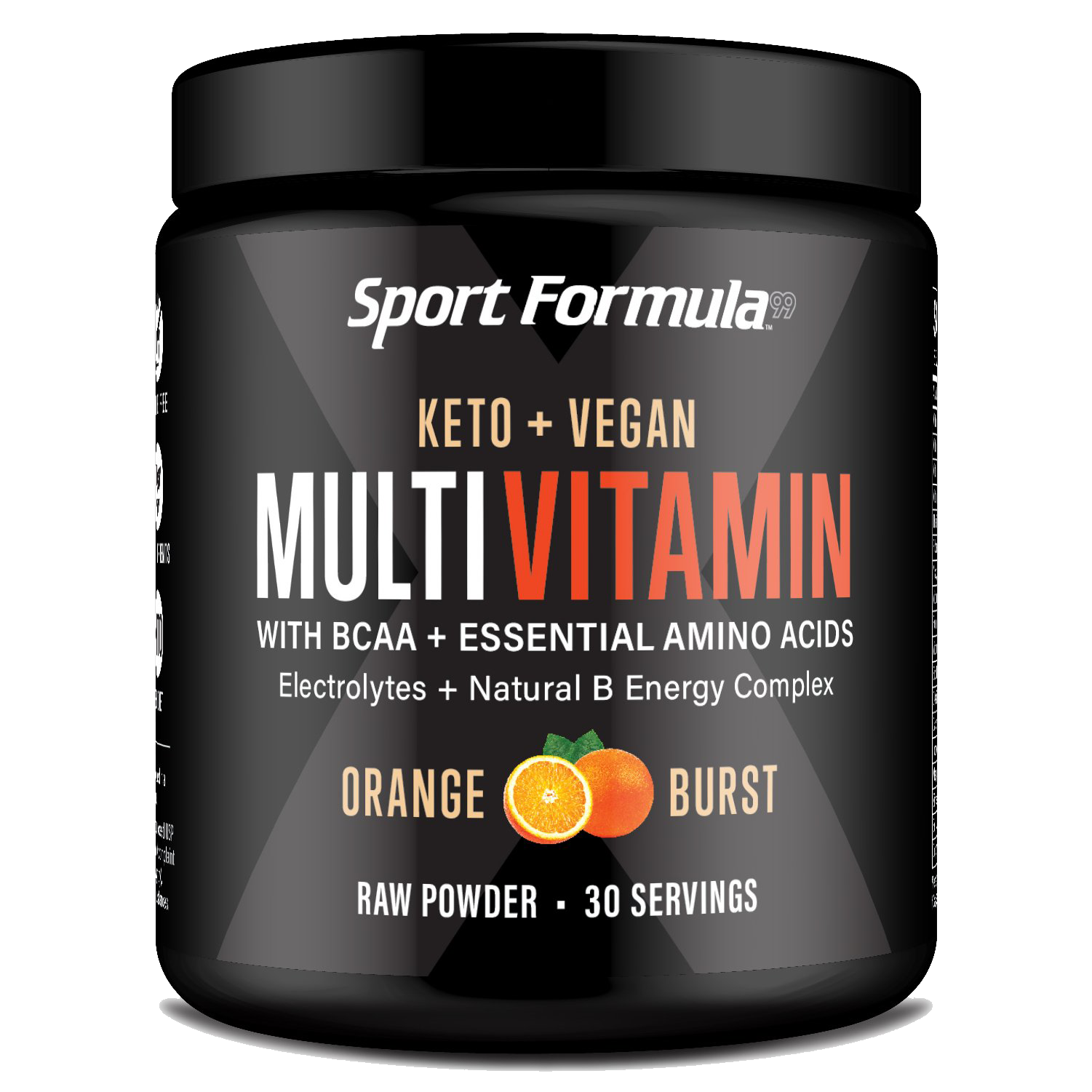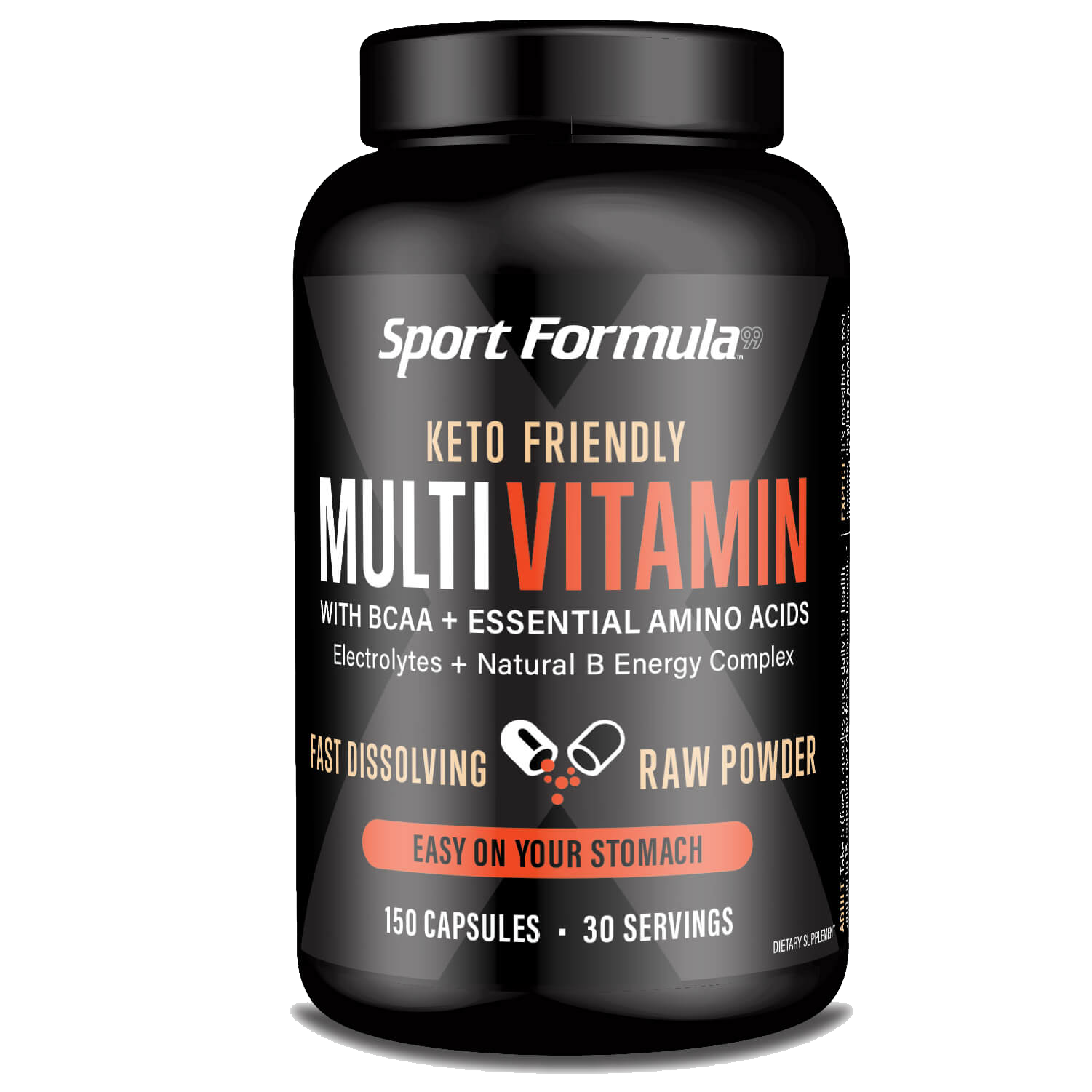
Wondering about the pros and cons of taking multivitamins? Multivitamins are popular health supplements designed to ensure you're getting enough vitamins and minerals to meet your daily nutritional needs. While supplements have many advantages, there are also some important drawbacks to consider before adding them to your daily routine.
Some forms and methods of taking multivitamins are old news—but 2025 marks a new era for those ready to explore options they may have overlooked. From flavorful multivitamin powders you can blend into smoothies, to sublingual delivery for faster absorption, today’s supplements are more advanced and convenient than ever.
As multivitamin trends and formulations continue to evolve in 2025, choosing the right supplement has never been more important. The key is selecting a multivitamin that fits your needs, lifestyle, and goals—and most importantly, one that your body can actually absorb.
Pros of Taking Multivitamins
1. Helps Prevent Nutritional Deficiency

Maintaining a balanced diet every day isn't always easy, especially when juggling a busy schedule, dietary restrictions, or unique health needs. Even those who pay close attention to their diet can inadvertently miss essential vitamins and minerals due to limited food choices or inconsistent eating habits.
This is exactly where multivitamin supplements step in. Multivitamins provide essential nutrients—such as Vitamin C, Vitamin B, and folic acid—that help fill-in nutritional gaps and prevent deficiencies, particularly when facing dietary limitations or irregular meal patterns. While multivitamins should never replace nutritious foods, they play a crucial role in supporting and enhancing your overall nutritional balance.
2. Provides an Energy and Concentration Boost

Feeling sluggish or struggling to stay focused throughout the day is a common issue, especially for busy people balancing work, family, and daily responsibilities. One of the benefits of multivitamins is their ability to provide a noticeable energy boost and improve your concentration levels.
Many multivitamin supplements contain essential nutrients like Vitamin B complex—including B12, folic acid, and B6—which play an important role in boosting energy and sharpening mental clarity. Vitamin C also contributes by helping reduce fatigue. For people constantly on-the-go or dealing with mental fog, incorporating multivitamins can lead to improved mood, sustained energy, and enhanced productivity throughout the day.
Support Your Energy, Focus, and Daily Nutrition—Without Overthinking Your Diet.
FILL THE GAP. FUEL YOUR DAY.
3. General Health Support and Disease Prevention

Multivitamins aren’t just about preventing nutritional gaps; they may also support overall health and reduce the risk of certain health issues. Research has indicated that regular multivitamin supplementation can help maintain healthy vision, support heart health, strengthen the immune system, and even contribute to better cognitive function as you age.
While the benefits vary depending on the individual and the quality of the vitamins taken, multivitamins can be a convenient way to enhance general wellness.
To explore more detailed benefits, we invite you to check out our comprehensive guide: “16 Reasons Why You Should Be Taking a Multivitamin Every Day”.
4. Convenience for Busy Lifestyles

One of the biggest advantages of multivitamins is their convenience. Modern life can make it challenging to consistently eat balanced, nutritious meals throughout the day. Whether you're traveling, working late, or juggling family responsibilities, multivitamins offer a practical solution for quickly meeting your daily nutritional needs.
Multivitamin supplements come in various forms to fit effortlessly into busy lifestyles:
- Pills, tablets, and capsules – Easy to swallow, convenient, and portable for on-the-go needs.
- Gummies – Chewable option popular among those who dislike swallowing pills.
- Multivitamin powders and drink mixes – Perfect for blending into water, smoothies, or your favorite beverages, multivitamin powders offer a tasty and efficient nutrient boost. For the best experience, look for flavored multivitamin powders that make daily supplementation something to look forward to.
- Sublingual vitamin powders – Some all-in-one vitamin powders can be placed under the tongue, allowing nutrients to be rapidly absorbed directly into your bloodstream, ideal for those who want quick absorption without the need for beverages.
Their portability also means you can conveniently keep pills, capsules, gummies, or vitamin powder packets in your desk, purse, or gym bag, ensuring essential vitamins and minerals are always within reach, no matter how packed your schedule gets.
Feel More Focused, Energized, and Balanced—Even on Your Busiest Days.
GET YOUR DAILY BOOST
5. Supports Daily Consistency for Long-Term Wellness

Taking a daily multivitamin is one of the simplest habits you can build to support your health goals over time. Even when your diet varies from day to day, a multivitamin helps create a nutritional safety net, ensuring that you maintain a consistent baseline of essential vitamins and minerals.
This daily consistency can be especially helpful during busy seasons, travel, illness recovery, muscle recovery, or dietary changes. By maintaining steady nutrient intake, multivitamin supplements support long-term wellness, immune resilience, and energy levels—regardless of what life throws your way.
Cons of Taking Multivitamins
1. Risk of Vitamin Toxicity from Overconsumption

While multivitamins can provide excellent nutritional support, taking more than the recommended amount can potentially lead to vitamin toxicity. Excessive intake of certain vitamins and minerals—particularly fat-soluble vitamins such as vitamins A, D, E, and K—can accumulate in the body and cause harmful side effects, including nausea, headaches, fatigue, and even organ damage in extreme cases.
It's important to pay attention to recommended daily intake guidelines and choose FDA-approved multivitamin supplements from reputable brands. Carefully following dosage instructions will help you avoid any risks associated with taking too many multivitamins.
2. Some Multivitamins Have Poor Absorption Rates

Not all multivitamins are equally effective in delivering essential nutrients. Many cheaper or lower-quality multivitamin supplements—especially certain pills and tablets—contain fillers or binding agents that hinder your body's ability to absorb vitamins and minerals efficiently. As a result, you may not receive the full nutritional benefit you’re expecting.
To ensure you're getting the most from your supplement, consider choosing the best cold-processed and raw multivitamin powders, sublingual forms, or liquid multivitamins. These types are specifically formulated for the best bioavailability and better absorption, allowing your body to fully utilize essential nutrients without unnecessary additives.
Smarter Supplements Start with Quality—Not All Multivitamins Deliver What They Promise.
CHOOSE CLEAN. ABSORB MORE.
3. Not All Multivitamins Are Properly Regulated or Transparent

One downside of multivitamin supplements is that they aren't subject to FDA approval before being sold. Unlike prescription medications, dietary supplements—including multivitamins—are regulated more loosely, which means not all products on the market are created equally.
Some may contain unnecessary additives, questionable ingredient sources, or misleading labels about their actual vitamin and mineral content. That’s why it’s important to choose multivitamins from brands that follow good manufacturing practices, list their ingredients transparently, and back up their claims with real data—not hype.
4. May Encourage Poor Dietary Habits or Over-Reliance

Another subtle disadvantage of taking multivitamins is that some people mistakenly rely on them as a substitute for a balanced diet. Multivitamins are designed to supplement—not replace—a diet rich in whole foods. Over-reliance on multivitamin supplements can potentially lead to poorer eating habits, as individuals may believe vitamins alone can offset unhealthy choices or nutrient-poor foods.
It's important to remember that the most effective way to achieve optimal health and nutrition is still through a balanced diet consisting of fruits, vegetables, whole grains, and lean proteins.
Multivitamins should be seen as nutritional "insurance," complementing your healthy lifestyle rather than replacing good dietary habits.
Multivitamins Should Support a Healthy Diet—Not Replace One. Choose the Smarter, Cleaner Way to Supplement.
TRUST WHAT YOU'RE TAKING
5. Potential for Interactions with Medications or Existing Conditions

Although multivitamins are generally safe for most people, they may sometimes interact negatively with medications or pre-existing health conditions. Certain vitamins and minerals can interfere with prescription drugs or exacerbate underlying medical issues, causing unexpected side effects or reduced effectiveness of treatments.
For example, Vitamin K can interfere with blood-thinning medications, and calcium supplements may impact the absorption of certain antibiotics.
To stay safe, always discuss your supplement regimen with a healthcare provider if you're currently taking medications or managing chronic health conditions.
Final Takeaway
While multivitamins aren’t a magic pill, they can play a valuable role in supporting a well-rounded health routine—especially when used to complement, not replace, a healthy diet. They offer real benefits: from preventing nutritional deficiencies and boosting energy, to supporting general wellness, convenience, and even mood balance. But like any supplement, they’re not one-size-fits-all. Overuse, poor absorption, or the wrong formula can hold you back instead of lifting you up.
And now, here in 2025, it’s not just about what’s in your multivitamin—but how you take it. Smoothie-friendly powders with 100s of recipes, flavored options, and sublingual delivery are changing the game. If you’ve been sticking to outdated methods or skipping your supplements altogether, this is your year to explore better options.
Choosing the right multivitamin in 2025 means choosing one that fits your routine, your goals, and your body’s ability to absorb it.
If you're looking for superior absorption, sublingual delivery, and raw, cold-processed raw nutrients, check out Sport Formula 99 Multivitamin Powder.
Available in powder packets, tubs, and capsules, it’s designed for high absorption and bioavailability and busy people who want to feel their best—without cutting corners on quality.
-

Powder Multivitamin Tub - Orange Burst
"Taking this over 10 years now and feel Amazing. My trainer recommended it for faster recovery times ...Read More
-

Powder Vitamin - Capsules No Flavoring
"Powder Capsules never upset my stomach and I feel complete when I take them. I am a super version o ...Read More
-

Powder Multivitamin - Packets Fruit Punch
"I always keep a couple vitamin packets in my pocket for when I need a little boost. I work hard on ...Read More
Disclaimer:
The information provided in this article is for educational and informational purposes only and is not intended as medical, nutritional, or professional advice. While we aim to share helpful insights and opinions for your reading enjoyment, individual health needs may vary. Always consult with a qualified healthcare provider, physician, or registered dietitian before making changes to your diet, supplement routine, or health regimen. Sport Formula does not diagnose, treat, or provide medical recommendations. Use this information responsibly and in accordance with your personal needs.


